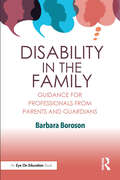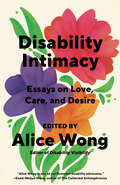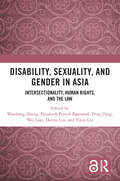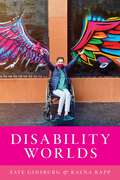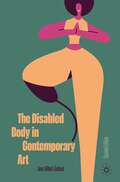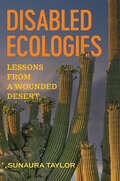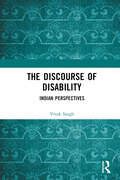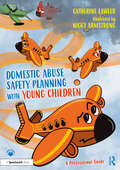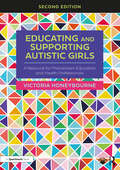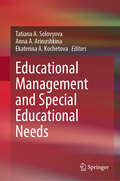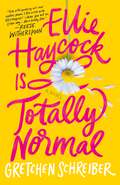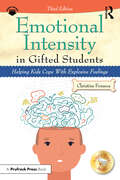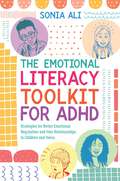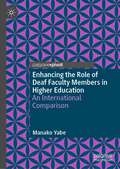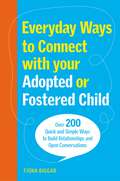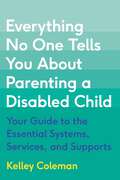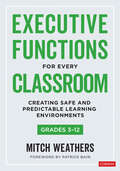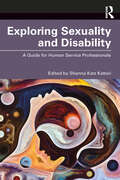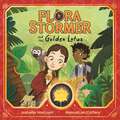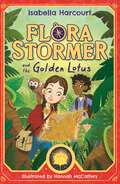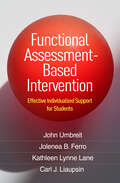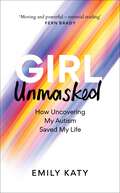- Table View
- List View
Disability in the Family: Guidance for Professionals from Parents and Guardians
by Barbara BorosonThis insightful guide shows professionals how to collaborate with parents and guardians of children with disabilities in empathic, respectful, knowledgeable, and supportive ways. Packed with first-hand accounts and advice from parents and guardians, this book shines a light on lived experiences and reveals paths toward meeting families where they are in order to move forward together. Boroson emphasizes that appreciating the real needs of these families is a crucial step beyond mere adherence to a generic set of professional best practices or principles. Whether working in the field of medicine, education, law, mental health, or related services—in any capacity—readers will come away with the holistic knowledge, inclusive language, productive strategies, and differentiated understanding needed to work effectively with the diverse families they serve. Included is a robust array of resources for families, such as books, articles, associations, organizations, and support networks, along with a website for additional, up-to-date resources.
Disability Intimacy: Essays on Love, Care, and Desire
by Edited by Alice WongThe much-anticipated follow up to the groundbreaking anthology Disability Visibility: another revolutionary collection of first-person writing on the joys and challenges of the modern disability experience, and intimacy in all its myriad forms.What is intimacy? More than sex, more than romantic love, the pieces in this stunning and illuminating new anthology offer broader and more inclusive definitions of what it can mean to be intimate with another person. Explorations of caregiving, community, access, and friendship offer us alternative ways of thinking about the connections we form with others—a vital reimagining in an era when forced physical distance is at times a necessary norm. But don't worry: there's still sex to consider—and the numerous ways sexual liberation intersects with disability justice. Plunge between these pages and you'll also find disabled sexual discovery, disabled love stories, and disabled joy. These twenty-five stunning original pieces—plus other modern classics on the subject, all carefully curated by acclaimed activist Alice Wong—include essays, photo essays, poetry, drama, and erotica: a full spectrum of the dreams, fantasies, and deeply personal realities of a wide range of beautiful bodies and minds. Disability Intimacy will free your thinking, invigorate your spirit, and delight your desires.
Disability, Sexuality, and Gender in Asia: Intersectionality, Human Rights, and the Law
by Wanhong Zhang, Elisabeth Perioli Bjørnstøl, Peng Ding, Wei Gao, Hanxu Liu and Yijun LiuThis book introduces experiential knowledge of the intersectionality of disability, sexuality, and gender equality issues. Scholars and disabled persons’ organizations in different Asian countries such as China, Vietnam, Myanmar, Nepal, and Japan have contributed to the book. It is a preliminary introduction of the frontline practice of Asian disability activism and the experience of women and LGBTIQ people with disabilities. It presents the direct participation of disability advocates in mapping how both women with disabilities and LGBTIQ individuals with disabilities realize their rights such as identity, work rights, personal safety, and sexual rights. Studies presented here explore the experience of empowering diverse disability groups and advocating for equality and non-discrimination. It explains how to use the leverage of the Convention on the Rights of Persons with Disabilities (CRPD) for further human rights campaigns in a broader context for disadvantaged groups. This collection is the product of a participatory research project, which aims to increase the capabilities of local disabled persons’ organizations and NGOs in utilizing human rights laws and encourage dialogue and collaboration between academia, people with disabilities, and human rights advocates. It will be essential reading for academics, researchers, policy-makers, and campaign groups.
Disability Worlds
by Faye Ginsburg Rayna RappIn Disability Worlds, Faye Ginsburg and Rayna Rapp chronicle and theorize two decades of immersion in New York City’s wide-ranging disability worlds as parents, activists, anthropologists, and disability studies scholars. They situate their disabled children’s lives among the experiences of advocates, families, experts, activists, and artists in larger struggles for recognition and rights. Disability consciousness, they show, emerges in everyday politics, practices, and frictions. Chapters consider dilemmas of genetic testing and neuroscientific research, reimagining kinship and community, the challenges of “special education,” and the perils of transitioning from high school. They also highlight the vitality of neurodiversity activism, disability arts, politics, and public culture. Disability Worlds reflects the authors’ anthropological commitments to recognizing the significance of this fundamental form of human difference. Ginsburg and Rapp’s conversations with diverse New Yorkers reveal the bureaucratic constraints and paradoxes established in response to the disability rights movement, as well as the remarkable creativity of disabled people and their allies who are opening pathways into both disability justice and disability futures.
The Disabled Body in Contemporary Art
by Ann Millett-GallantThe second edition offers an essential update to the foundational first edition, The Disabled Body in Contemporary Art. Featuring updated chapters and case studies, this second edition will not only expand on the first edition but will bring a new focus to contemporary disabled artists and their embodied, multimedia work.
Disabled Ecologies: Lessons from a Wounded Desert
by Sunaura TaylorA powerful analysis and call to action that reveals disability as one of the defining features of environmental devastation and resistance. Deep below the ground in Tucson, Arizona, lies an aquifer forever altered by the detritus of a postwar Superfund site. Disabled Ecologies tells the story of this contamination and its ripple effects through the largely Mexican American community living above. Drawing on her own complex relationship to this long-ago injured landscape, Sunaura Taylor takes us with her to follow the site's disabled ecology—the networks of disability, both human and wild, that are created when ecosystems are corrupted and profoundly altered. What Taylor finds is a story of entanglements that reach far beyond the Sonoran Desert. These stories tell of debilitating and sometimes life-ending injuries, but they also map out alternative modes of connection, solidarity, and resistance—an environmentalism of the injured. An original and deeply personal reflection on what disability means in an era of increasing multispecies disablement, Disabled Ecologies is a powerful call to reflect on the kinds of care, treatment, and assistance this age of disability requires.
The Discourse of Disability: Indian Perspectives
by Vivek SinghThis book explores the concept of disability through a social, political, cultural, religious, and economics lens. It challenges the categorization of ‘physically-disabled’ produced by way of legal, medical, political, cultural, and literary narratives that comprise an exclusionary discourse.The volume discusses themes like disability and identity politics; disability and the western epistemology; disability in India; disability and the Indian English fiction and Hindi cinema to question the embodied hegemony of ‘norms’ and their effects in the construction and history of societies. It analyses select literary and cinematic texts like Trying to Grow, Fireproof, and Animal’s People; and movies, Black and Lafangey Parindey to critically examine the representation of disabled people as freak, monstrous and animal. The book also makes policy recommendations for inclusive education and work norms for disabled people.This book will be beneficial for scholars and researchers of disability studies, cultural studies, film studies, and English literature.
Domestic Abuse Safety Planning with Young Children: A Professional Guide (Safety Planning with Young Children)
by Catherine LawlerThis guidebook is an essential companion to the Pilgrim’s Bumpy Flight story and is designed to be read by professionals to ensure the effective and safe use of the storybook. Pilgrims Bumpy Flight has been created to help young children aged 5–7 experiencing domestic abuse, to explore the concepts of physical and emotional safety. Safety planning with a child offers a way to help them vocalise their feelings and understand what to do when something does not feel right. The professional guide will help supporting adults facilitate safety planning that is experienced as emphatically curious, safe and where the child’s opinion matters. It provides up-to-date information on domestic abuse, childhood trauma, practice tips and how to complete a safety plan with a young child using the storybook as the key vessel of communication and exploration. Key features include: • Accessible information about domestic abuse and coercive control based on the latest research. • Guidance around direct work and safety planning with young children. • Practical activities building off Pilgrim’s story, including printable material. • Things to consider and ways to use the storybook to facilitate a conversation with a child, as well as page-by-page helpers notes on the narrative. • A comprehensive list of helplines and organisations in place to support adult victims/survivors of domestic abuse. Used alongside the storybook, this professional guide is a crucial tool for the early years sector, education staff and those working in children’s services, including safeguarding officers, family support workers, social workers and children’s IDVAs. Both books should be used in tandem with agency policy, procedure and guidance.
Educating and Supporting Autistic Girls: A Resource for Mainstream Education and Health Professionals
by Victoria HoneybourneAutistic girls, especially those educated in mainstream environments, have often been missed or misdiagnosed. There is now, however, greater awareness of how autism can present in females, why these girls can remain ‘invisible’, and what education and health professionals can do to provide better support. Fully revised and updated, this practical book shines a light on the insights, opinions and experiences of autistic girls and women, providing a rich insight into school life from an autistic perspective. It explores the difficulties and disadvantages that autistic girls can face in educational settings and offers guidance on how to best support them, with a wealth of strategies reflecting good practice in the field of autism and education. The resource also contains a broad range of worksheets and activities on key issues and includes new sections on anxiety, masking, home life, social media, gender and sexual identity. Key features include: A wealth of case studies to illustrate different topics Guidance on best practice when working with autistic girls New audits to help staff and pupils to identify strengths and areas to improve Easy-to-implement strategies and tips to help professionals adapt to environments and policies for autistic students Activities and resources for young autistic females to support them in developing self-awareness, coping strategies and learning skills With the voices of autistic girls and young women woven throughout, drawing upon their experiences of education – from learning and communication, to friendships, transitions and interpreting the world – this is an essential resource for education and health professionals working with autistic girls, particularly in mainstream environments.
Educational Management and Special Educational Needs
by Tatiana A. Solovyova Anna A. Arinushkina Ekaterina A. KochetovaThis book systematizes the latest findings on the clinical, psychological, and pedagogical features of today’s children with special educational needs (SEN) and expands the scientific understanding that characterizes such children. The book develops a system of education and assistance for children with SEN, including children with locomotor disabilities, intellectual disabilities, autism spectrum disorders, and hearing and visual impairments. The book is intended for heads of educational authorities, parents, specialists working with children with special educational needs, psychologists, teachers, methodologists, specialists in the field of inclusive education, and students and teachers in special education of pedagogical and psychological departments of higher education institutions.
Ellie Haycock Is Totally Normal
by Gretchen SchreiberThe Breakfast Club meets Five Feet Apart in this big-hearted novel from debut author Gretchen Schreiber.Ellie Haycock has always separated her life into sections: Ellie at home and Ellie at the hospital. At home, Ellie is a proud member of her high school’s speech and debate team alongside her best friend and her boyfriend. At the hospital, Ellie has a team of doctors and a mom who won’t stop posting about the details of her illness online. It’s not hard for Ellie to choose which of the two she prefers.But this latest hospital stay is different. Ellie becomes close with a group of friends, including Ryan, a first-timer who’s still optimistic about the doctors that Ellie stopped trusting years ago. Despite their differences, she can’t seem to keep him out of her head. Ellie’s life has never been ordinary—but maybe this time it will be extraordinary.
Emotional Intensity in Gifted Students: Helping Kids Cope With Explosive Feelings
by Christine FonsecaTeaching children how to manage their intense emotions is one of the most difficult aspects of parenting or educating gifted children. Emotional Intensity in Gifted Students is an indispensable resource for parents and educators seeking to understand why gifted children can be so extreme in their behavior and how to manage the highs and lows that accompany emotional intensity. Presented in an easy-to-read, conversational style, this revised and updated third edition pulls from contemporary research to depict changes in how we understand and support gifted children as well as an increased understanding of trauma, social-emotional learning, and empathy development. Chapters feature role-plays and strategies designed to show parents and teachers how to interact and guide gifted children in a way that teaches them how to recognize, monitor, and adjust their behavior. Also featuring updated resources, worksheets, and checklists, this practical new edition is a must-read for anyone wishing to make a positive and lasting impact on the lives of gifted children.
The Emotional Literacy Toolkit for ADHD: Strategies for Better Emotional Regulation and Peer Relationships in Children and Teens
by Sonia AliChallenges with emotional regulation and rejection sensitivity can disproportionately affect children and teens with ADHD, impacting on their development at school and their relationship with their peers.Developed for children and young people who experience difficulties with emotional regulation, SEND specialist Sonia Ali, shares a mentoring Intervention programme to support a child or young person with this issue at school or at home. Covering concepts like the fight, flight or freeze response and the 'Window of Tolerance', managing anger outbursts and overwhelm or navigating conflict with peers, this easily digestible book will help educators and carers support children and teens to develop core emotional literacy skills in an enjoyable way!This accessible, step-by-step guide is packed with activities, including role-play situations, discussion-based statements, quizzes and more. The programme can be followed sequentially or 'dipped into' to support a child with a particular issue when relevant.
Enhancing the Role of Deaf Faculty Members in Higher Education: An International Comparison
by Manako YabeThis book is based on an international, mixed methods research project that conducted interviews with 25 deaf or hard-of-hearing (DHH) faculty members from mainstream universities and 19 university students who took classes taught by DHH faculty members and collected surveys from 57 DHH faculty members and 104 university students worldwide. The author reports on their experiences of accessibility at their institutions and makes recommendations based on the findings. The book will serve as a user guide or supplemental text for DHH faculty members, researchers, students, and academic interpreters, as well as university administrators and disability service directors who are looking to improve disability provision at their institutions.
Everyday Ways to Connect with Your Adopted or Fostered Child: Over 200 Quick and Simple Ways to Build Relationships and Open Conversations
by Fiona BiggarThis indispensable guide has over 200 simple, easy to implement therapeutic parenting activities which you can easily build into everyday life. Starting with a simple explanation of therapeutic parenting and how to do it, it provides a host of strategies and activities to help tackle common challenges faced by families affected by trauma. This includes improving communication and relationships, lessening conflict, building confidence, creating structure and routine, and handling big emotions. The activities range from short daily check-ins to reinforce attachment through to creative therapeutic activities. The ideas in this book will help create an environment of acceptance, safety, and respect, and enable you and your child to build a stronger, more connected relationship.
Everything No One Tells You About Parenting a Disabled Child: Your Guide to the Essential Systems, Services, and Supports
by Kelley ColemanThe honest, relatable, actionable roadmap to the practicalities of parenting a disabled child, featuring personal stories, expert interviews, and the foundational information parents need to know about topics including diagnosis, school, doctors, insurance, financial planning, disability rights, and what life looks like as a parent caregiver. For parents of disabled children, navigating the systems, services, and supports is a daunting, and often overwhelming, task. No one explains to parents how to figure out the complex medical, educational, and social service systems essential to their child&’s success. Over and over, parents are being asked to reinvent the exact same wheels. According to the CDC, &“Every 4 ½ minutes a baby is born with a birth defect in the United States.&” That&’s 1 in 33. There&’s no handbook for how to do this. Until now. Presented with empathy and humor, Everything No One Tells You About Parenting a Disabled Child: Your Guide to the Essential Systems, Services, and Supports gives parents the tools to conquer the stuff, so that they can spend less time filling out forms, and more time loving their children exactly as they are. With over a decade of experience navigating these systems for her own child, author Kelley Coleman presents key information, templates, and wisdom alongside practical advice from over 40 experts, covering topics such as diagnosis, working with your medical team, insurance, financial planning, disability rights and advocacy, and individualized education plans. Everything No One Tells You About Parenting a Disabled Child gives parents the tools they need to stop wasting unnecessary time, money, and stress. If you need to know how to actually do the things, this book is for you.
Executive Functions for Every Classroom, Grades 3-12: Creating Safe and Predictable Learning Environments
by Mitch WeathersEvery educator wants to know: What has the greatest impact on student success? The answer: executive function skills. They are crucial for students′ academic success and personal growth, yet many of our students lack the skills required to engage in learning, such as organization, planning, time management, and self-regulation. This book shows how educators can create a more engaging and effective learning experience while addressing the epidemic of disengagement and executive dysfunction. With practical guidance to make the skills "stick" for students, this vital resource also provides The three keys to teaching executive functions: Clarity, Modeling, and Routine An explanation of the specific executive functioning skills essential for student success Strategies for students to practice executive functions within the context of what they are learning Practical guidance for establishing a consistent and safe learning environment Guidance on how to expose all students to this universal MTSS/RTI Tier 1 intervention Educators can empower students to take more risks, improve their academic performance, and prepare them for the future with the help of this innovative resource.
Executive Functions for Every Classroom, Grades 3-12: Creating Safe and Predictable Learning Environments
by Mitch WeathersEvery educator wants to know: What has the greatest impact on student success? The answer: executive function skills. They are crucial for students′ academic success and personal growth, yet many of our students lack the skills required to engage in learning, such as organization, planning, time management, and self-regulation. This book shows how educators can create a more engaging and effective learning experience while addressing the epidemic of disengagement and executive dysfunction. With practical guidance to make the skills "stick" for students, this vital resource also provides The three keys to teaching executive functions: Clarity, Modeling, and Routine An explanation of the specific executive functioning skills essential for student success Strategies for students to practice executive functions within the context of what they are learning Practical guidance for establishing a consistent and safe learning environment Guidance on how to expose all students to this universal MTSS/RTI Tier 1 intervention Educators can empower students to take more risks, improve their academic performance, and prepare them for the future with the help of this innovative resource.
Exploring Sexuality and Disability: A Guide for Human Service Professionals
by Shanna Katz KattariOffering a current, comprehensive, and intersectional guide for students, practitioners, and researchers, this book synthesizes existing scholarship on culturally responsive practices that assist in exploring, understanding, and affirming the sexuality(ies) of disabled, chronically ill, neurodivergent, and Mad individuals. Drawing on an intersectional framework, it integrates insights drawn from an interdisciplinary body of scholarship including psychology, social work, sociology, history, political science, women and gender studies, cultural studies, and education along with perspectives from the practitioners who are actively defining the next generation of best practices. By highlighting the incredible resilience and resistance of disabled individuals’ and communities’ sexuality and sexual well-being, this book challenges narratives that rely primarily on a one-dimensional view derived from the medical model and the view of disability as something to be “fixed” – or at least tolerated – rather than celebrated. In a world that pathologizes and devalues the sexual existence of disabled individuals, it illustrates how to create thriving communities and relationships, and how they can organize to find their voice, providing a counter-narrative of empowerment that fosters hopefulness, power, and health. It will be of interest to all scholars, students, and professionals across a variety of professions, including social work, psychology, counseling, policy, healthcare, education, community organizing, and multiple social service settings.
Flap Your Hands: A Celebration of Stimming
by Steve AsbellThis fascinating, groundbreaking picture book by an autistic creator celebrates stims--the repetitive movements that provide focused stimulation to people on the autistic spectrum.When you're feeling overwhelmedAnd the world's too much to bear...If your feelings bubble overBut they have no place to go... Maybe it would help to move!Want to try a stim? When four neurodivergent kids face some stressful moments, they use body movements called stims to self-regulate their emotions. One boy tickles the space next to his face; a girl flutters her fingers by her ears; another boy kicks his feet like splashy flippers; another girl directs her hands like a conductor! As the children say fun words, flap their hands, and engage in other stims, their actions build in energy and joyousness until their inner calm is restored. Delightful text and color-drenched illustrations by debut author-illustrator Steve Asbell invites other neurodivergent readers to join in on the action. Flap Your Hands is a wonderful celebration and reminder that stimming is a natural and healthy thing to do!
Flora Stormer and the Golden Lotus: Book 1 (Flora Stormer #1)
by Isabella HarcourtFlora Stormer sets off to discover a magical flower hidden deep in the rainforest - and ends up finding . . . HERSELF! A brand-new series combining the magic and adventure of Jumanji with a message celebrating difference and self-acceptance. Flora Stormer, a talented young artist with Tourette's Syndrome, is helping her father prepare for an expedition to search for the legendary golden lotus - a plant with magical healing properties. But when her dad falls ill, Flora bravely sets sail in his place, hoping the mythical plant might save him. Equipped with her paints and a magical map, Flora treks through the rainforest, encountering dangerous animals and poisonous plants along the way. But the greatest threat she faces is from a greedy collector determined get his hands on the flower first. Can Flora and her new friends stop him from stealing the golden lotus and cursing the rainforest forever?
Flora Stormer and the Golden Lotus: Book 1 (Flora Stormer #1)
by Isabella HarcourtFlora Stormer sets off to discover a magical flower hidden deep in the rainforest - and ends up finding . . . HERSELF! A brand-new series combining the magic and adventure of Jumanji with a message celebrating difference and self-acceptance. Flora Stormer, a talented young artist with Tourette's Syndrome, is helping her father prepare for an expedition to search for the legendary golden lotus - a plant with magical healing properties. But when her dad falls ill, Flora bravely sets sail in his place, hoping the mythical plant might save him. Equipped with her paints and a magical map, Flora treks through the rainforest, encountering dangerous animals and poisonous plants along the way. But the greatest threat she faces is from a greedy collector determined get his hands on the flower first. Can Flora and her new friends stop him from stealing the golden lotus and cursing the rainforest forever?Praise for Flora Stormer and the Golden Lotus: "A fun, pacy story with a delightful heroine and a powerful message," Cath Howe, author of Ella on the Outside."There's a little bit of magic and a whole lot of heart in Flora's inspiring adventure!" Lucy Strange, author of Our Castle by the Sea.
From Pixels to Purpose: Exploring Digital Inclusion and Personal Growth
by Jalasa SapkotaJalasa Sapkota's book presents a compelling fusion of two interconnected themes: digital inclusion and personal fulfillment. The initial section delves into the pressing need for digital accessibility, highlighting challenges faced by individuals with disabilities in navigating online environments. Through insightful articles, Sapkota calls for a more equitable digital future, scrutinizing both institutional commitments and pragmatic realities. The subsequent part shifts focus to a deeply personal exploration of self-discovery and relationships. Through provocative narratives, Sapkota unravels the intricacies of women's desires, happiness, and understanding relationships, prompting readers to reflect on their own experiences and connections. This book serves as an invaluable resource, offering diverse perspectives on disability rights, digital inclusion, and the journey toward personal fulfillment. Whether you're an advocate, a seeker of personal growth, or a curious reader, Sapkota's work promises to inspire, provoke, and enlighten, providing profound insights into the essence of inclusion, selfhood, and the human condition.
Functional Assessment-Based Intervention: Effective Individualized Support for Students
by John Umbreit Jolenea B. Ferro Kathleen Lynne Lane Carl J. LiaupsinFrom noted authorities, this book presents a comprehensive approach to designing and implementing evidence-based Tier 3 behavior interventions for K–12 students. The authors' functional assessment-based intervention (FABI) process has been supported by multiple peer-reviewed studies conducted in authentic educational environments. Step by step, chapters spell out proven methods to define target behaviors, determine the function of the undesirable behavior, identify appropriate replacement behaviors, and deliver and monitor intensive interventions. Illustrated with real-world case examples, the book shows how to embed FABI within a school's integrated tiered system of supports. Guidance for scaling FABI district- and statewide is also provided. Ethical issues, professional standards, equity concerns, and cultural and linguistic considerations are addressed throughout. In a convenient large-size format, the book includes reproducible checklists and forms that can also be downloaded for ease of use.
Girl Unmasked: How Uncovering My Autism Saved My Life
by Emily Katy'Emily's moving book is a powerful testimony that shines a light on the continued failure of health services to provide any kind of meaningful improvement for autistic people. Should be essential reading for mental health professionals and anyone with autism in their lives.' - FERN BRADY, author of Strong Female Character 'This book will bring so many readers self-recognition and comfort.' - DEVON PRICE, author of Unmasking Autism'Vulnerable, affecting and deeply personal, this book will go from a message in a bottle to a rallying cry for many autistic women, girls and young people. We are not alone.' - Elle McNicoll, bestselling author'A brilliant, thorough exploration of autistic experience, delivered with humanity, compassion and vivid clarity.' - Pete Wharmby, author of Untypical'A magnificent read which manages to be informative, engaging, sad and uplifting all at the same time. Whether you're discovering that you're autistic yourself or you simply want to understand autistic people better, this is a must-read.' - Cathy Wassell, CEO Autistic Girls Network charity & author of Nurturing Your Autistic Young Person'The book I wish I'd been able to read when I was younger.' - Sarah Gibbs, author of Drama QueenTo the outside world, Emily looks like a typical girl, with a normal family, living an ordinary life. But inside, Emily does not feel typical, and the older she gets, the more she realises that she is different.As she finally discovers when she is 16, Emily is autistic. Girl Unmasked is the extraordinary story of how she got there - and how she very nearly didn't. Still only 21, Emily writes with startling candour about the years leading up to her diagnosis. How books and imagination became her refuge as she sought to escape the increasing anxiety and unbearable stresses of school life; how her OCD almost destroyed her; how a system which did not understand autism let her down; and how she came so close to the edge that she and her family thought she would never survive.In this simple but powerful memoir, we see how family and friends became her lifeline and how, post-diagnosis, Emily came to understand her authentic self and begin to turn her life around, eventually becoming a mental health nurse with a desire to help others where she herself had once been failed.Ultimately uplifting, Girl Unmasked is a remarkable insight into what it can be like to be autistic - and shows us that through understanding and embracing difference we can all find ways to thrive.
